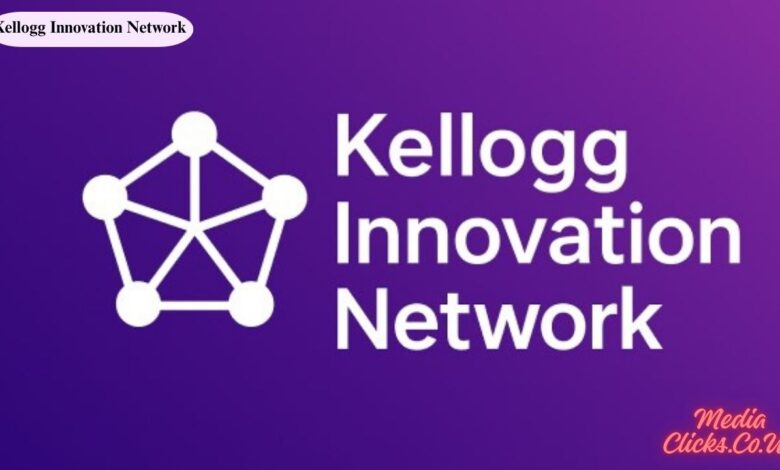Kellogg Innovation Network Fostering Global Innovation Through Collaborative Leadership

Introduction & Overview
The Kellogg Innovation Network represents a unique gathering place where senior leaders come together to address some of the world’s most pressing challenges through collaborative innovation. This exclusive community serves as a forum where innovative thinking meets practical business strategy, creating opportunities for executives to share insights and develop solutions that transcend traditional organizational boundaries.
Foundation and Purpose
Professor Robert C. Wolcott established this distinctive network in 2003 with a clear vision: to create a space where business leaders could engage in meaningful dialogue about innovation and its role in solving global challenges. The network operates with a specific purpose—bringing together diverse minds to explore how innovation can drive positive change across industries and sectors.
Northwestern University Connection
Operating under the umbrella of Northwestern University’s Kellogg School of Management, the network benefits from academic rigor and research excellence. This affiliation ensures that discussions and programs are grounded in the latest business thinking while remaining practical and applicable to real-world situations. The connection to one of the world’s premier business schools adds credibility and intellectual depth to every initiative.
Core Mission
At its heart, the mission centers on creating a forum for senior leaders to tackle global challenges through collaborative innovation. This isn’t just about networking—it’s about bringing together the right people with the right expertise to generate solutions that might not emerge from isolated thinking. The collaborative approach recognizes that today’s complex problems require diverse perspectives and cross-industry insights.
Core Structure & Membership
The Invitation-Only Community Model
The network operates on an invitation-only community model, which ensures that members share a common commitment to innovation and leadership excellence. This selective approach allows for more meaningful exchanges and deeper relationships among participants. While some view this exclusivity as a limitation, it creates an environment where high-level strategic conversations can flourish without distraction.
Who Joins This Community
Members include leading innovative thinkers, business leaders, and diverse alumni from the Kellogg School of Management. This mix creates a rich tapestry of experience and perspective. Typical members range from executives and strategists to R&D heads and policy influencers who shape the direction of their organizations and industries.
The community represents a cross-disciplinary network spanning global companies, NGOs, government entities, and academia. This diversity ensures that discussions aren’t confined to a single sector’s perspective but instead benefit from multiple viewpoints. A marketing executive from a consumer goods company might find themselves in conversation with a policy maker, a university researcher, and a startup founder—all within the same session.
Key Programs & Activities
Annual Events
The network hosts two flagship gatherings each year: the KIN Global Summit and KIN Catalyst Forums. These events serve as anchor points for the community, bringing members together for intensive sessions on current innovation challenges and opportunities.
The Global Summit typically features thought leaders, case study presentations, and interactive workshops that push participants to think differently about their approaches to innovation. The Catalyst Forums take a more focused approach, diving deep into specific topics or industries that members identify as particularly relevant.
KIN Ecosystem Expeditions
One of the most popular programs involves visits to global innovation hubs like Tel Aviv, Berlin, and Silicon Valley. These expeditions aren’t typical business tourism—they’re carefully curated experiences designed to immerse participants in thriving innovation ecosystems.
The pilot expedition to Panama in February 2012 marked the beginning of this program, followed by an Israel expedition in March 2014. These journeys provide exposure to startup accelerators, venture capital networks, and policy labs that are shaping the future of innovation in their regions.
Participants don’t just observe—they engage directly with entrepreneurs, investors, and local leaders to understand what makes these ecosystems tick. The insights gained often spark new thinking about how to foster innovation within their own organizations and communities.
Educational Initiatives
The learning never stops with this network. Workshops, webinars, and seminars at Stanford and other leading institutions provide ongoing education on emerging trends and best practices. These sessions cover everything from new technologies to organizational change management.
Mentorship programs connect experienced leaders with those earlier in their innovation journeys, creating valuable relationships that extend beyond formal program boundaries. Executive education programs offer deeper dives into specific topics, often resulting in certifications or credentials that participants can apply immediately in their work.
Focus Areas & Topics
Technology and Business Innovation
The network maintains a strong focus on innovation, business, technology, and artificial intelligence. Robert C. Wolcott, as a keynote speaker at many events, often addresses how these elements intersect to create new opportunities and challenges for organizations.
Corporate culture and leadership receive significant attention as well. Participants explore how the keynote speaker and other thought leaders approach building organizations that can sustain innovation over time. The discussions recognize that technology alone isn’t enough—the human and organizational elements are equally critical.
Analytics, supply chain, and digital transformation form another key pillar of focus. In today’s data-rich environment, understanding how to leverage information for competitive advantage has become essential. The keynote speaker presentations often highlight practical examples of companies that have successfully navigated digital transformation.
Workforce and Social Responsibility
Workforce adaptation to technological change represents an increasingly important topic as automation and artificial intelligence reshape job markets and skill requirements. Members share strategies for helping their teams develop new capabilities while maintaining engagement and productivity.
Data utilization and AI-driven decision making continue to evolve rapidly, and the network serves as a forum for leaders to understand both the opportunities and the ethical considerations involved. These aren’t abstract academic discussions—they focus on real decisions that leaders face today.
Sustainability and socially responsible innovation reflect a growing recognition that business success and social impact aren’t separate goals. Members explore how innovation can address environmental challenges while creating business value.
Academic Integration
Research Connections
The connection to the Center for Research in Technology & Innovation (CRTI) ensures that the network benefits from cutting-edge research and academic thinking. This relationship creates a two-way flow of ideas, with practitioners informing research directions and researchers providing evidence-based insights to business leaders.
Collaboration on case studies and white papers captures lessons learned from network activities and member experiences. These publications serve the broader business community while documenting the network’s contributions to innovation thinking.
Intellectual Contributions
The development of innovation models cited in global business journals demonstrates the network’s intellectual impact. Robert C. Wolcott’s frameworks on scaling innovation in complex ecosystems have gained recognition beyond the network itself, influencing how organizations approach innovation challenges.
These frameworks don’t exist in isolation—they emerge from the collective experience and insights of network members, tested against real-world challenges and refined through ongoing dialogue.
Impact & Notable Projects
Sector-Specific Initiatives
The network has launched targeted initiatives in several industries. Mining industry transformation projects have explored how traditional resource extraction companies can adopt new technologies and sustainable practices. Finance sector innovation initiatives have examined how financial services organizations can remain relevant in an era of fintech disruption.
Social enterprise development programs have helped organizations blend profit motives with social missions, demonstrating that business success and positive social impact can reinforce each other.
The World Innovation Network
Related ventures like The World Innovation Network (TWIN) represent an independent platform building on KIN’s principles. TWIN extends the collaborative innovation model to new contexts and audiences, demonstrating how the core ideas can adapt and scale.
Broader Impact
The tangible and symbolic impact on global innovation practices extends beyond specific projects or initiatives. Network members carry insights back to their organizations, influencing decisions and strategies that affect thousands or even millions of people. The symbolic impact comes from demonstrating what’s possible when leaders commit to collaborative problem-solving across traditional boundaries.
Leadership
Robert C. Wolcott’s Role

Led by Robert C. Wolcott—a published author, keynote speaker, and Kellogg professor—the network benefits from consistent vision and leadership. His role extends beyond administration to curating event topics and speakers that keep the network at the forefront of innovation thinking.
As a keynote speaker at global events, Wolcott brings visibility to the network while sharing insights that have been developed and tested within the community. His academic position ensures that leadership remains grounded in research and evidence rather than trends or fads.
Faculty Involvement
Faculty involvement from the Kellogg School of Management brings additional expertise and perspectives to network activities. These faculty members contribute research insights, facilitate discussions, and help translate academic findings into practical applications that leaders can implement.
Criticisms & Challenges
Exclusivity Concerns
The invitation-only model naturally raises exclusivity concerns. Critics argue that limiting participation restricts the diversity of perspectives and creates an echo chamber of similar viewpoints. These concerns have merit and represent an ongoing tension that the network must navigate.
Questions about diversity of thought and accessibility persist despite efforts to include members from various backgrounds and industries. The challenge lies in maintaining the intimacy and trust that come with a smaller, vetted community while ensuring that diverse voices contribute to discussions.
Scalability Debates
Debate over scalability versus the conceptual nature of outcomes reflects a fundamental question: Should the network focus on generating ideas and frameworks, or should it prioritize implementing specific projects with measurable results? Both approaches have value, and the network continues to balance these different expectations.
The tension between elite collaboration and mass accessibility represents perhaps the most significant challenge. How can the network maintain its effectiveness while making its insights and approaches available to a broader audience? Recent moves toward more inclusive engagement with Kellogg alumni suggest recognition of this challenge and attempts to address it.
Future Directions
Adapting to New Challenges
Adaptation to new global crises—including climate change, geopolitical conflict, and digital ethics—will test the network’s ability to remain relevant. These challenges require not just innovation but also wisdom about unintended consequences and long-term thinking.
The need for more inclusive, scalable, and decentralized innovation models reflects changing expectations about how leadership communities should operate. The next generation of leaders may expect different levels of openness and accessibility than past generations.
Balancing Priorities
Balancing relevance with the unique value proposition of high-level strategic dialogue presents an ongoing challenge. The network must evolve without losing what makes it special—the depth of relationships and the quality of conversations that emerge from careful curation.
Maintaining actionable outcomes while expanding access will require creativity and experimentation. Digital tools offer new possibilities for engagement, but they also risk diluting the personal connections that make the network powerful.
How to Engage
Membership Application
The membership application process through the Kellogg School of Management starts with expressing interest and demonstrating alignment with the network’s values and mission. While selective, the process aims to identify leaders who will both contribute to and benefit from participation.
Benefits of Membership
Benefits include networking opportunities that extend far beyond typical business events, mentorship relationships that can shape career trajectories, visibility within an influential community, and professional development through exposure to cutting-edge thinking and practices.
The network remains open to organizations across various industries, recognizing that innovation challenges and opportunities aren’t confined to specific sectors. This cross-industry approach enriches discussions and sparks unexpected connections.
Opportunities for Innovators
Opportunities for startups and entrepreneurs include access to experienced executives who can provide guidance, potential partnerships or customers, and exposure to innovation practices from established organizations. For entrepreneurs, the network offers a window into how large organizations think about innovation and what challenges they face in implementing new ideas.
For more information, visit Media Clicks.



